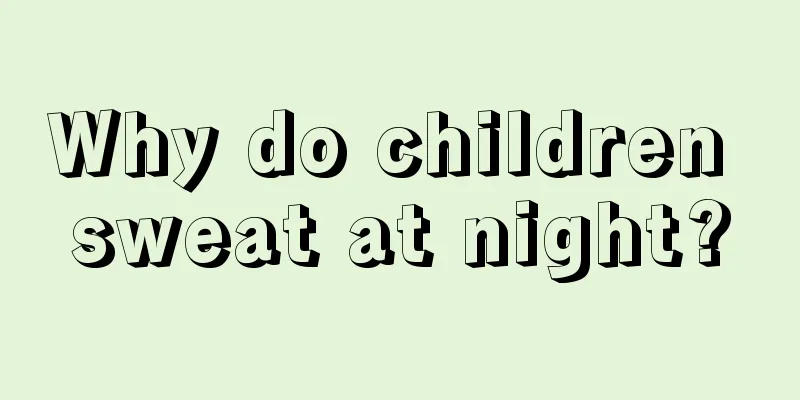Why do children sweat at night?

|
Compared with adults, children may have more problems. And we can understand it. Because we still need to take care of all aspects of the child's problems. Some children may sweat easily when they sleep at night. Mothers who discover this situation may become nervous. However, you don't have to worry too much, maybe the child is just suffering from fever. However, the editor still takes parents to find out. So, what is going on with this child sweating at night? Reasons why children sweat at night: Sweating is a kind of nerve reflex in the body. Because babies are in the stage of growth and development, their physiological metabolism is vigorous and the regulatory function of the nervous system is not very sound, so they sweat a lot. This is medically called physiological hyperhidrosis. Babies with this kind of physiological hyperhidrosis will sweat more obviously in the following situations, such as in summer, when the baby wears too many or too tight clothes, when the baby is active, when eating hot food, or when the baby is nervous or scared. If your baby has no other abnormal symptoms, that is, it is physiological hyperhidrosis. Such babies sweat a lot, not because of physical weakness. Parents do not need to worry and no special medication is needed. Countermeasures: Parents need to take good care of babies who sweat a lot, including: (1) Babies should drink more water; (2) Cultivate the baby's ability to adapt to the environment in life, such as wearing loose clothes and not using too thick bedding; (3) Change your baby's clothes frequently, bathe him/her more often, and ensure that his/her skin is clean; (4) Pay attention to education and do not spoil the baby. This is not only beneficial to the baby's mental development, but also can accelerate the improvement of the baby's nervous system regulatory function. In addition, babies who sweat excessively for a long time will lose zinc in their sweat, so they need to consciously increase the intake of zinc-rich foods, such as eggs, meat, liver, beans and peanuts, to meet the zinc needs for their growth and development. If your baby shows symptoms such as anorexia, slow weight and height gain, you should see a doctor and use zinc-containing drugs under the doctor's guidance. Generally, zinc gluconate has fewer side effects and is easier for babies to accept. Note that calcium supplements will prevent the absorption of zinc in the intestines; many babies take various calcium supplements preventively, and zinc supplements should be avoided at the same time as calcium supplements. 2. Babies with rickets and excessive sweating In addition to the baby's physiological hyperhidrosis, hyperhidrosis caused by rickets is also a common cause in infants and young children. Infants and young babies need 400~800IU of vitamin D every day. If they do not get enough sunlight and do not supplement vitamin D food in time, they are likely to suffer from vitamin D deficiency. In addition, babies grow and develop rapidly, so vitamin D deficiency will cause rickets. Babies with rickets will show symptoms of irritability, crying, and restless sleep; they will sweat a lot, especially on the head, but it has nothing to do with climate. In addition to excessive sweating, babies with rickets also have skeletal deformities, such as square skull, wide fontanelle, delayed closure; delayed teething, flared ribs, bracelets or anklets, etc. Babies with rickets and excessive sweating need to treat rickets to solve the problem of excessive sweating. Countermeasures: 1. Vitamin D and calcium treatment must be carried out under the guidance of a doctor, and measures to prevent rickets should be taken after the treatment is completed, such as adding foods rich in calcium and vitamin D to the baby, such as egg yolks, animal livers, dairy products, etc.; 2. Make sure your baby gets more sun exposure. Babies under 2 years old should take 400 IU of vitamin D and about 600 mg of calcium every day (there are vitamin D preparations and calcium preparations specifically for babies in pharmacies) to meet the needs of rapid growth and development. 3. Other care requirements for babies with rickets and hyperhidrosis are the same as those for babies with physiological hyperhidrosis. 3. Hyperhidrotic babies who need special attention Physiological hyperhidrosis and rickets-related hyperhidrosis are the most common in infants and young children, but there are some rare conditions, such as tuberculosis, chronic infection lesions, parasitic infections, anemia, hyperthyroidism, and even tumors. Hyperhidrosis is a concomitant manifestation of these diseases and parents should pay attention to them. In addition to hyperhidrosis, babies with the disease may also have low-grade fever, weight loss or emaciation, sallow complexion, rash and other manifestations. If parents find any of these symptoms in babies with hyperhidrosis, they should take their babies to see a doctor in time to avoid delaying diagnosis and treatment of the disease. Why do children sweat at night? The editor has helped parents understand it. I also hope that you will pay close attention. You should have a good understanding of all aspects of your child's situation. If you find anything abnormal in your child, you should seek medical attention immediately. In this way, the health of children can be guaranteed. It will be more secure for your baby's future life! |
<<: What should I do if my child sweats on his back when sleeping at night?
>>: Is it normal for a 10 month old baby to have teeth?
Recommend
What should I do if my child has stomach wind? These methods to cope
If a child has wind in his stomach, parents must ...
Hip dysplasia in babies
We all know that babies are in a stage of rapid g...
Why does my child keep blinking?
In life, there are many reasons why children blin...
What’s going on with the red blood streaks on my child’s face?
When there are many red blood streaks on the face...
What are the symptoms of myocarditis in children?
Children's physical health has always been a ...
Reasons why your baby's stomach growls
Many children always feel uncomfortable here and ...
What does a child lack that will affect his intellectual development?
The intellectual development of children is of gr...
How many days will it take for the baby's fever to subside due to food accumulation?
Many parents do not pay attention to their childr...
Why does my baby vomit after eating egg yolk?
Everyone knows that eggs contain a lot of nutrien...
How to reduce the thickness of children’s thighs?
Many children have thick thighs during their grow...
Treatment of hip synovitis in children
Every child is the apple of the parents' eyes...
What to do if a 7-year-old child has a nosebleed
Some children have nosebleeds, so they need to pa...
Why is the area around the belly button cold?
In life, some people may feel cold around their b...
Why can’t babies drink yogurt? Nutrition experts tell you the answer
Many parents may have heard that babies cannot dr...
What to do if your child has measles and fever
Children's bodies are very fragile and theref...









